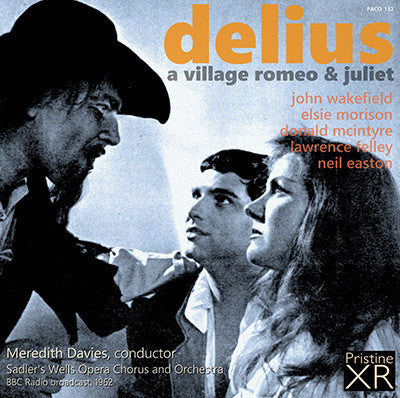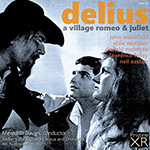
This album is included in the following sets:
This set contains the following albums:
- Producer's Note
- Full Track Listing
- Cover Art
- Full Cast Listing
The brilliant 1962 Sadler's Wells production of Delius' rarely-recorded opera
"A work of indisputable beauty and dramatic validity, outstandingly well conducted by Meredith Davies" - The Spectator, 1962
This live broadcast was transmitted from the Sadler's Wells Theatre in London on the BBC's Third Programme on the evening of Tuesday 10th April, 1962, and preserved excellently from the FM broadcast on open-reel tapes from which this release was drawn. This marks only the sixth full recording of the opera to be issued, though of course The Walk to the Paradise Garden is a highly popular orchestral piece, drawn from the opera's penultimate act.
The tapes were in excellent condition. There was some intrusive electrical hum, which was easily removed, and two very short patches were required to cover tape turns. Sound quality from the original BBC transmission was exemplary, with a generally very quiet audience. Alas this was broadcast just five months before the start of experimental stereo broadcasts by the BBC, though the application here of our Ambient Stereo processing does go some way to giving a little breathing space around the mono sound image.
Due to the opera's short length when spanned across two CDs I've added a rare bonus recording of Sir Thomas Beecham conducting the "Blue Network Symphony Orchestra", an ensemble of top rank New York orchestral players assembled for four radio concerts Beecham gave on the nascent ABC radio network in the spring of 1945. His performance of The Walk to the Paradise Garden formed part of the concert broadcast on 7 April 1945, which can be heard in full on PASC461.
Andrew Rose
-
DELIUS A Village Romeo and Juliet
Broadcast from Sadler's Wells Theatre
BBC Third Programme, Tuesday 11 April, 1962
Soloists (see cast list)
Sadler’s Wells Chorus
Sadler’s Wells Orchestra
Conductor – Meredith Davies
-
DELIUS The Walk to the Paradise Garden (bonus track)
Sir Thomas Beecham, conductor
Blue Network Symphony Orchestra
An ABC radio broadcast 7 April, 1945
Live from the Ritz Theater, New York City
Also appears on PASC461
DELIUS A Village Romeo and Juliet
Broadcast from Sadler's Wells Theatre
BBC Third Programme, Tuesday 11 April, 1962
Sali – John Wakefield
Vrenchen – Elsie Morison
The Dark Fiddler – Neil Easton
Manz - Lawrence Felley
Marti - Donald McIntyre
Sali as a child – Soo Bee Lee
Vrenchen as a child – Sheila Amit
The Slim Girl – Margaret Gale
The Wild Girl – Shirley Chapman
The Poor Horn Player – John Chorley
The Hunchbacked Bass-Fiddler – Donald McIntyre
First Peasant – Cecil Lloyd
Second Peasant – William Davies
First Woman – Gwynneth Jenkins
Second Woman – Dilys Davies
Third Woman – Ruth Roberts
Wheel-of-Fortune Woman – Angela Wheeldon
Cheap Jewellery Woman – Joan Clarkson
Gingerbread Woman – Joan Davies
Showman – Tom Swift
Merry-go-Round Man – Kenneth Fawcett
Shooting-Gallery Man – Charles Draper
Three boatmen – Tom Swift, Kenneth Fawcett, John Chorley
Sadler’s Wells Chorus
Chorus Master – David Tod Boyd
Sadler’s Wells Orchestra
Leader – Barry Collins
Sadler's Wells producer: Basil Coleman
Conductor – Meredith Davies
MusicWeb International Review
There is a real sense of magic in this performance which is most attractive
Towards the end of last year, when reviewing
the reissue of Mackerras’s recording of this opera, I mentioned in
passing a pirated set of LPs conducted by Meredith Davies deriving from a
live performance at the Alhambra Theatre in Bradford. At first glance I
assumed that this new set from Pristine was a straightforward transfer
of that recording to CD; but, although the performing forces are
identical with those IGS discs, they are heard here in a BBC broadcast
relay from Sadler’s Wells’s own theatre in London. I have never heard
the IGS set, but in his review of the LPs in Volume Three of Opera on Record
John Steane remarks that the “audience seems to pick on all the
quietest, loveliest passages for their coughing spasms.” That problem is
less in evidence here, although the close of The walk to the Paradise Garden
and the very final bar of the opera are both disturbed by bronchial
contributions from the public, who are however considerate in reserving
their applause until the music has actually ceased and are generally
inoffensively quiet elsewhere. The broadcast sound too is clean and
well-balanced, unlike the Alhambra recording which was described by
Steane as “restricted in spaciousness and clarity”. Indeed, apart from
occasional moments of overloading and some evidence of rapid and
panic-stricken adjustment of the volume control, the sound is very good
mono of its period. Nor does the live performance suffer from any of the
orchestral slips one might expect in such a densely woven score, with
only a couple of minor fluffs from the horns and some overly rebarbative
low woodwind to cause any concern.
And the casting here is
very good, too. In his review John Steane comments that “its lovers are
truly suited to their roles” and commends both Elsie Morison and John
Wakefield as the best exponents of them on disc (he was writing before
the appearance of the Mackerras set with Helen Field and Arthur Davies).
I still have a particular liking for Elisabeth Harwood on the later
commercial EMI set conducted by Meredith Davies – nobody else can quite
approach the sense of calm stillness that she achieves at the beginning
of Scene Four – but like Arthur Davies, John Wakefield is young and
eager as Sali in a way that eludes Robert Tear on EMI. John Steane was
fairly rude about Neil Easton as the Dark Fiddler, describing him as
having “some character but not really enough voice”; what struck me was a
lack of substance in the lower register but a ringing top which
compensated to a considerable degree, but I have to admit that either
John Shirley-Quirk (on the later Davies set) or Thomas Hampson (for
Mackerras) have more sense of presence in the enigmatic role. Steane
also described the Marti (incorrectly identified as Manz) of the young
Donald McIntyre (long before his days as Wotan) as “excessively
rough-sounding”; but I welcomed his solidity of tone is a role that is
after all pretty unpleasant.
In my previous review I commented
that the later Davies recording on EMI employed a revised version of the
libretto by Tom Hammond which I assumed had been commissioned for that
performance; but here ten years earlier we are given the same revisions,
which do much to overcome the unidiomatic translation originally
provided by Delius’s wife Jelka Rosen. When reviewing the EMI set for
the Gramophone, Deryck Cooke had complained about alterations
of the rhythms to accommodate this revised text, commenting in
particular on Harwood’s delivery of the line “what that woman said is
true”; here Elsie Morison gives us the same line with the exact rhythm
of Delius’s score, which may sound slightly less natural as a setting of
the words but which preserves the sense of solemnity which Cooke missed
with Harwood. Indeed, the precision of the singing throughout, with the
exception of the rather blowsy chorus, is exceptional and for much of
the time there is no need to have recourse to a printed text (which is
just as well, since none is provided).
In my review of the
Mackerras set I lamented the rather prosaic treatment of the closing
scene with the bargemen on the river, where his Austrian singers lacked
the sort of magic that would convincingly enable Vreli to confuse their
voices with those of angels. On his EMI studio set Davies scored
strongly with the voices of such singers as John Noble and Ian Partridge
as well as a real sense of enchantment; and miraculously he manages to
achieve the same effect here with much less well-known singers.
Elsewhere he has a tendency to be somewhat brisk with Delius’s writing
(notably in the dream sequence of Scene Four), no doubt with dramatic
considerations in mind, and it has to be admitted that the decidedly
boxy acoustic of the old Sadler’s Wells theatre cannot begin to compete
with the studio sound provided for Davies by EMI, or for Mackerras by
Argo. Nevertheless, for those who love this score as much as I do, there
is a real sense of magic in this performance which is most attractive;
and for those who already own either of the studio sets, this might well
be regarded as a valuable adjunct. As I mentioned last year, the later
Davies recording remains unavailable separately; so for those wanting
the complete opera by itself in a modern recording, choice is restricted
to Mackerras (now on a mid-price Decca reissue available from Presto
Classical).
The second disc concludes with a 1945 recording of the interlude The walk to the Paradise Garden
conducted with an American orchestra by Beecham, but this is not really
competitive with either of Beecham’s recordings of the complete opera
with the BBC Symphony Orchestra or the Royal Philharmonic, and some of
Beecham’s adjustments of the tempo sound excessive by modern standards
(although I have no doubt that Delius, always willing to accept
Beecham’s adjustments of his scores, would have approved). The recording
has been well served by its remastering, but the dynamic range has been
severely restricted even by comparison with the theatre performance
earlier on this same disc. Tracking on the discs is limited to
individual scenes, with separate cues provided only for the dream
sequence and the Paradise Garden interlude.
In conclusion may I once again put in a plea for someone to reissue the BBC tapes of the early Delius operas Irmelin, The magic fountain and Margot le rouge,
once available on Artium CDs but long since deleted? Amazon currently
lists sets of the latter two at prices ranging from £48.74 upwards, with
two copies of Irmelin quoted at a whopping £175.00 and £196.00. Who on earth would be willing to pay such sums, no matter how desirable the issues?
Paul Corfield Godfrey
MusicWeb International, July 2016

